The Clemes Experience

The Clemes Experience
Introduction
At Clemes, we aim to provide an environment that equips Years 11 and 12 students with:
- A deep understanding of the School’s Purposes and Concerns statement.
- The opportunity to actively practise the School’s Purposes and Concerns through a range of structured and unstructured opportunities.
- A broad understanding of and empathy for the Quaker testimonies of Simplicity, Peace, Integrity, Community, Equality and Earthcare.
- A rigorous academic program that equips students with the skills to achieve an Australian Tertiary Admission Rank (ATAR) by completing the Tasmanian Certificate of Education (TCE) or the International Baccalaureate (IB) Diploma Programme (DP).
- The opportunity to undertake Vocational Education and Training (VET) Courses.
- The skills to meet the Australian Core Skills Framework standards in learning, reading, writing, oral communication and numeracy (for TCE students).
- The skills to fulfil the characteristics of the IB Learner Profile (for IBDP students).
- The skills to fulfil the outcomes of our Curriculum Statement: Our intention is to enable students to gain the skills, knowledge and understanding they will need for living.
- An environment where the development of the whole child is paramount, not just a focus on academic results.
- An understanding that Clemes has a non-selective, open-entry policy for all students that encourages and celebrates diversity.
- A diverse range of course selection options that cater for a variety of future pathways.
- The opportunity to complete the Clemes Certificate that promotes Creativity, Action and Service.
We would like Years 11 and 12 students at Clemes to have:
- A focus on belonging to a community and a willingness to contribute to something greater than the individual.
- A culture of independent decision making in a socially considerate way.
- A restorative way of dealing with conflict and disputes and a strong sense of social justice.
- An environment that equips students for the demands of the everyday world.
- An environment that actively encourages students to ‘let their lives speak’.
- An environment that promotes and challenges ideas, stereotypes and assumptions.
- An environment that raises awareness of and encourages action on a range of issues and dilemmas facing the modern world.
- A wide range of service opportunities that enable the student to engage with the broader community.
- A willingness to accept the challenges facing society and initiate action to counter them.
- An environment where students are given the opportunity to demonstrate and initiate leadership and stewardship in a range of areas.
- A culture of ‘continuous improvement’ which allows students to reach their potential and challenge their perceived boundaries and limitations.
- A sense of autonomy and self-awareness where students make considered decisions and understand the relevant implications.
- The tools for self-analysis and self-reflection through silence and other means that aim to build resilience and other coping mechanisms for the everyday world.
Important Information
The first choice to be made when considering courses of study at Clemes is which of two broad pathways to follow. These are:
- International Baccalaureate Diploma Programme (IBDP)
- Tasmanian Certificate of Education (TCE)
The Tasmanian Certificate of Education (TCE) is based on a number of criteria, including Literacy, Numeracy and IT components. Students must qualify for the TCE Certificate in order to receive an ATAR. The TCE can be taken in conjunction with one or more Vocational Education and Training (VET) courses. These pathways are detailed in a separate section to follow. Students who successfully complete the requirements of the IB Diploma also receive a TCE Certificate.
Australian Curriculum
The current development of a national curriculum will continue to have an impact on courses in the future. In particular, TCE courses across a range of areas are being progressively renewed over the next three to five years in line with the current 9-12 Project Tasmanian Educational review. Revised subjects will usually be equivalent to current courses and programs should be planned on that basis.
University Entrance Requirements
Both the TCE and the IB Diploma may be used for university e15th ntrance.
Successful completion of the IB Diploma is sufficient to meet the requirements for university entrance. If the requirements for the award of the IBDP are not met, an IB Course award will be issued showing what scores were gained in which subjects. It is possible to gain a place in university with individual IB Courses, depending on the details of those scores and subjects.
If you study for the TCE, university entrance requires that certain conditions must be fulfilled with regard to the number and year of study of pre-tertiary subjects. Some details are contained in the table on the following pages, with more detailed information in the separate IB Diploma and TCE sections.
The TCE is the preferred pathway for students who do not intend to go on to university. In this case, strong consideration should be given to completing a VET course as part of the program.
Prerequisites
In order to be permitted to study some specific subjects or courses at university, you may need to have achieved satisfactory achievement in certain subjects in Years 11 or 12, either within the IBDP or the TCE. Many Australian mainland universities require pre-tertiary English at Year 11 and/or 12. You will need to check the relevant University Handbooks to be sure.
Tertiary Entrance Scores and ATAR
In order to allocate students to university faculties with quotas, a tertiary entrance score is calculated based on your results. Each state of Australia uses a different system for calculating the score, but there is a conversion that allows comparisons with students from each state, as well as with students who have completed the IB Diploma. This Australia wide score is known as the ATAR. Details of how these scores are calculated are contained in the IB Diploma Programme and TCE sections.
Find out what an ATAR is via video below:
VET Courses / Credit Transfer for TAFE Courses
You may be considering going on to Technical and Further Education instead of university. Some TCE subjects, and all VET courses, are counted towards courses at that level so you can obtain your qualifications more quickly and do not have to repeat work you have covered successfully.
Subject Choices
Once you have decided which pathway to take, consult the IB Diploma, TCE or VET section for the procedures for subject selection. Complete a set of IB Diploma or TCE choices using the online process. If you are choosing a VET course, indicate this as one of your TCE choices.
IB Inclusive Assessment Arrangements & Tasmanian Assessment, Standards and Certification (TASC) Reasonable Adjustments
Both the IB and TASC provide schools and their students with mechanisms to ensure all students have equal access to their programmes. These are detailed below:
IBDP – Inclusive Access Arrangements
The IB believes that all candidates should be allowed to demonstrate their ability under assessment conditions that are as fair as possible. Standard assessment conditions may put some candidates at a disadvantage by preventing them from demonstrating their level of attainment. Inclusive access arrangements may be applied in these circumstances if it is observed that they could reduce or minimise barriers for the candidate.
Inclusive access arrangements may be necessary due to:
- long-term learning support requirements;
- temporary medical conditions;
- additional language learning.
To be eligible for inclusive access arrangements, supporting documentation from an appropriate specialist/GP/psychologist will be required.
All arrangements are submitted through The Friends' School IBDP Coordinator, Sarah Walker. Applications for known and ongoing conditions are due by 15th May each year. The IB understands that situations arise and thus emergency applications can be made throughout the DP for students who are impacted by injury or illness.
If you have any queries around eligibility, or the application process, please contact Sarah Walker at: swalker@friends.tas.edu.au
TASC Reasonable Adjustments
It is recognised by TASC that some Senior Secondary students may not be able to access or participate in courses accredited by TASC on the same basis as other students without some reasonable adjustments (formerly known as special provisions).
These reasonable adjustments are applied to both internal and external assessments for TCE courses. To be eligible for reasonable adjustments, there will need to be supporting documentation from an appropriate specialist, with recommendations from them about the adjustments needed.
All reasonable adjustments are submitted through the School’s TCE Coordinator, Jane Morrison. Applications for known ongoing conditions are due to TASC by late May. Each application is assessed by a TASC officer and both the student and the School will be notified via email when a decision is reached.
Emergency applications can be made later in the year for students impacted by injury or illness.
If you have any queries around eligibility or the process for application please contact Jane Morrison (jmorrison@friends.tas.edu.au) or visit the TASC website, where a copy of the application form can be found.
Study Support & Study Skills
A range of support alternatives is available for all students regardless of the path they choose, in addition to the assistance that all our teachers provide. These include a mentoring program where students assist others, and in some instances we can put students in touch with tutors outside the School.
There are also a number of study skills units available that focus on supporting students. These are 50 hour units, and can be part of students’ load and timetables, or students can usually attend as and when they need assistance. There are units in English, Mathematics and Science, as well as a General Study Skills course. Details are given in the TCE English, Mathematics and Science sections. IB Diploma students can also access study skills through these units as well as other opportunities.
Study Support Course
Study Support is offered for students who need extra help in organising and completing their work. All students who have taken a Study Line or Subject Support in the High School are expected to choose Study Support. Other students may be advised by teachers or tutors to take this option, either as an ongoing commitment or as a shorter term solution to study concerns. Classes are small, with individual help available. IB Diploma students can also access Study Support following consultation with the IB Diploma Coordinator and the Learning Support department.
The Friends' School is an IB World School.
CRICOS Registration 00477G

